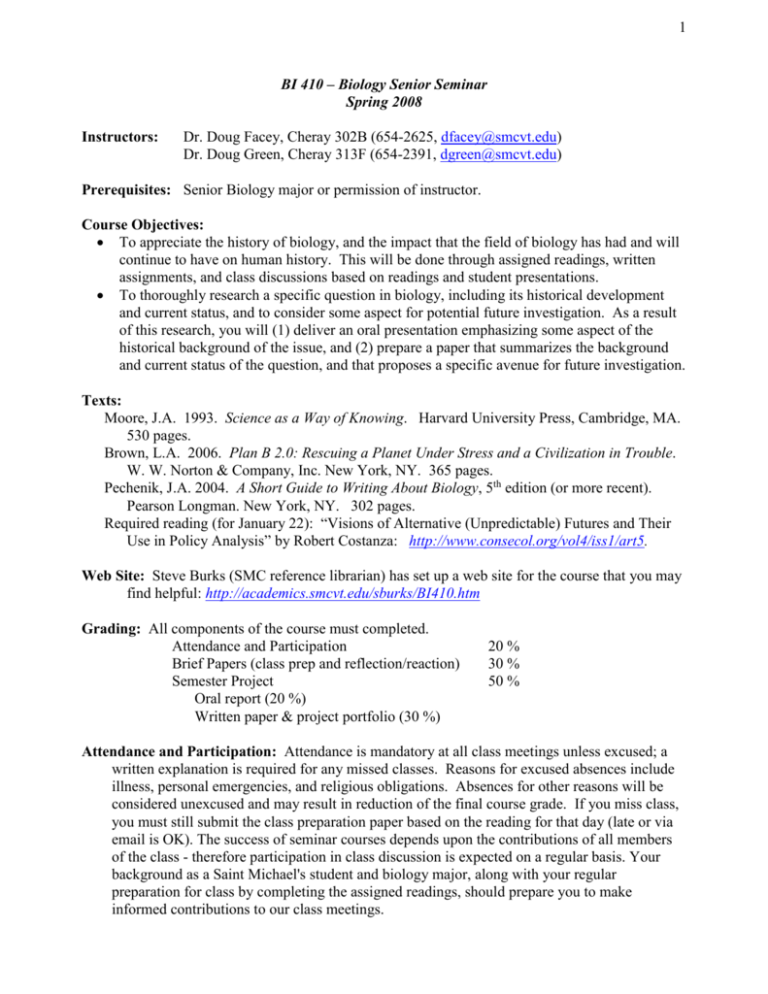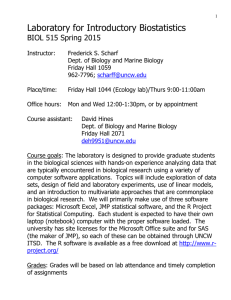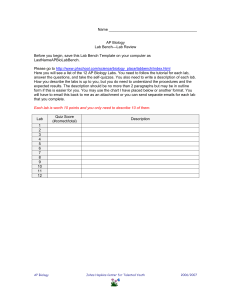
1
BI 410 – Biology Senior Seminar
Spring 2008
Instructors:
Dr. Doug Facey, Cheray 302B (654-2625, dfacey@smcvt.edu)
Dr. Doug Green, Cheray 313F (654-2391, dgreen@smcvt.edu)
Prerequisites: Senior Biology major or permission of instructor.
Course Objectives:
To appreciate the history of biology, and the impact that the field of biology has had and will
continue to have on human history. This will be done through assigned readings, written
assignments, and class discussions based on readings and student presentations.
To thoroughly research a specific question in biology, including its historical development
and current status, and to consider some aspect for potential future investigation. As a result
of this research, you will (1) deliver an oral presentation emphasizing some aspect of the
historical background of the issue, and (2) prepare a paper that summarizes the background
and current status of the question, and that proposes a specific avenue for future investigation.
Texts:
Moore, J.A. 1993. Science as a Way of Knowing. Harvard University Press, Cambridge, MA.
530 pages.
Brown, L.A. 2006. Plan B 2.0: Rescuing a Planet Under Stress and a Civilization in Trouble.
W. W. Norton & Company, Inc. New York, NY. 365 pages.
Pechenik, J.A. 2004. A Short Guide to Writing About Biology, 5th edition (or more recent).
Pearson Longman. New York, NY. 302 pages.
Required reading (for January 22): “Visions of Alternative (Unpredictable) Futures and Their
Use in Policy Analysis” by Robert Costanza: http://www.consecol.org/vol4/iss1/art5.
Web Site: Steve Burks (SMC reference librarian) has set up a web site for the course that you may
find helpful: http://academics.smcvt.edu/sburks/BI410.htm
Grading: All components of the course must completed.
Attendance and Participation
Brief Papers (class prep and reflection/reaction)
Semester Project
Oral report (20 %)
Written paper & project portfolio (30 %)
20 %
30 %
50 %
Attendance and Participation: Attendance is mandatory at all class meetings unless excused; a
written explanation is required for any missed classes. Reasons for excused absences include
illness, personal emergencies, and religious obligations. Absences for other reasons will be
considered unexcused and may result in reduction of the final course grade. If you miss class,
you must still submit the class preparation paper based on the reading for that day (late or via
email is OK). The success of seminar courses depends upon the contributions of all members
of the class - therefore participation in class discussion is expected on a regular basis. Your
background as a Saint Michael's student and biology major, along with your regular
preparation for class by completing the assigned readings, should prepare you to make
informed contributions to our class meetings.
2
Brief Papers:
Class preparation papers – At the beginning of every class meeting at which there is a
scheduled student presentation, except for your own presentation, you must turn in a brief
(less than 200 words) comment on some aspect of the assigned reading for that day that
you found particularly interesting. This should not be summary of the reading, but instead
should be a comment, observation, or question on some part of the reading and an
indication of why you found this interesting. These brief papers must be typed, and please
put your name, the due date, and reading assignment (text and chapter titles) at the top of
the page. The entire assignment should fit on just one side of a printed sheet of paper
(single spacing is fine). Papers will only be accepted at the beginning of the appropriate
class meeting – so be sure to get things printed out well ahead of time; late papers will not
be accepted (except in the case of absence, but recall from the previous paragraphs that
there is a penalty for absences).
Reflection/Reaction papers – for 10 of the student presentations you must type a
reflection/reaction paper based on the presentation and the discussion that follows. This
should not be just a summary of either the presentation or the discussion, but it should be a
thoughtful response to the class meeting. Explain what you found particularly thoughtprovoking and why. Include comments and reflections on how this connected to other
coursework or life experiences. A printed copy of your typed paper is due at the
instructor’s office by 3 pm on Friday following the class (sooner is fine). Late papers will
not be accepted. Reflection/Reaction papers should be approximately 400-500 words and
single spaced, and therefore should fit on one side of a printed page. Please put your
name, and the date and topic of the presentation at the top of the page.
Semester Project: Each member of the class will complete a semester project that involves
thoroughly researching a topic in the field of biology, including its historical roots and current
status, and proposing a future avenue for research to address a question on that topic. We will
work together in the first week of the semester to find topics that are of interest to each of you,
and that can be linked to readings in the texts. A thesis statement and brief description of your
intended project, along with at least 3 reference citations, is due on February 7. Your oral report
will be scheduled to coincide with readings from the texts that are in some way related to your
topic. Please keep in mind throughout this project that one of the main objectives is to have
you read, understand, and synthesize published, primary research articles in an area of your
choice within the field of biology.
Oral Report: Each member of the class must deliver an oral presentation that connects to the
assigned reading for the day and that summarizes some aspect of the historical background
or context of their major project. Presentations must be 40-45 minutes in length and
delivered using PowerPoint. Presentations shorter than 40 minutes will receive lower
grades, and may be weighted by the appropriate fraction. (For example, the grade for a 30
minute presentation may be multiplied by 0.75 to account for the partial fulfillment of the
assignment.) Similarly, presentations longer than 45 minutes may also receive a lower
grade for inadequate preparation and planning.
The presentation should not be a summary of the assigned reading, but instead provide a
more detailed consideration of a topic related to the reading assigned for that date. A brief
review of some significant points from the reading may be appropriate to make a clear
3
connection between the reading and the presentation. Once that connection is made, the
presentation should go into greater depth about some specific aspect of the subject. This
should include (1) specific identification of the person(s) or topic(s) being discussed; (2)
clear explanation of any studies or experiments, including the inspiration or motivation for
the study/experiment; (3) discussion of how the discovery was accepted at the time of its
"publication;" and (4) the significance of this issue today, such as whether the early work
still stands or further investigation has modified our understanding of the issue. The topic
addressed in the oral presentation is to be part of the background for the written proposal,
and both of these should be discussed with the instructor in the first two weeks of the
semester – before you get too far into the research.
The presentation should be based mainly on published, primary research articles in
biology, although some other sources may be appropriate as well. Please include a final
slide listing all sources. Each presenter is to provide the class with a single-page, typed
Abstract and Outline of the talk one class period before the presentation. In addition, each
presenter is to give the instructor an electronic copy of their presentation either via email
or by posting a copy of it under “Doc Sharing” in eCollege. Please do this before 8 am on
the day or your presentation so that your instructor can print a copy to have during the
presentation.
Written Paper & Portfolio: Each member of the class must complete a paper that explores a
somewhat specific question in the field of biology and proposes a framework for further
exploration of that question. The paper must be based mainly on published, primary
research articles in biology, and must include a clear statement of the question or issue to
be explored, a brief summary of the historical background and context of the question, a
summary of the current status of the field, and some suggestions as to what you believe
should be done next to continue progress within that field. Literature should be cited
throughout the paper, using the proper citation format taught in Biological Reading &
Writing (BI 205). A complete and properly formatted Literature Cited section must be
provided containing at least 10 published sources, with at least six of those published,
primary research articles in biology. Please note that these are minimum requirements,
you may include more. The text of the paper should be 10-12 pages, double spaced, with 1
inch margins and 12 pt Times Roman font. Please include page numbers (inserted using
Word, not added by hand). There is no need for a separate cover page.
The opening paragraph of the paper should briefly introduce the context of the question,
why it is important, and then state the purpose of the paper (the thesis), including the
specific question to be explored and the main point that you intend to make. The
background/context part of the paper can overlap with some of the main points of the oral
presentation, but should not repeat the entire presentation. After the background/context,
you should provide a summary of the current status of the field, which should be based on
your reading of published primary research articles. Finally, there must be a wellreasoned explanation for what you think should be done in the future and why. Use
appropriate references throughout the paper. Please note that frequent quoting of sections
of text from other sources is not acceptable in writing your papers for this course. You
must understand your sources and write in your own words based on that understanding.
4
You must keep copies of all articles used, all written notes and summaries, and all of your
drafts in a project portfolio, and turn in the entire portfolio for evaluation. Your grade for
this part of the project will depend, in part, on the completeness of the portfolio. Written
notes or summaries are required for all sources in order to make sure that you fully
understand and can explain the information in the articles that you read. Please note that
underlining or highlighting do not count as note-taking as they do not demonstrate careful
reading or understanding. You should keep all of your drafts, but be sure to put the date
on each of them so that the proper sequence can be reconstructed. Keeping all drafts also
will allow you to reconsider past edits and quickly recover earlier text if you wish.
The instructor will assign peer-review groups within the class, and you are required to
provide a draft to classmates in your group for peer-review by March 25 (or sooner). The
peer-review comments that you receive must also be included in the portfolio. You also
will provide peer review to classmates in your group, and the thoroughness of your review
and constructiveness of your comments will be a part of your grade on the project. Peerreview comments should be typed and returned to the author within one week (by April 1
if draft is received on March 25). Please give a copy of the comments to the instructor.
The final paper and portfolio are due on April 15; projects that are turned in late will not
receive full credit (probable penalty of 5 points per calendar day).
Evaluation: Please note the following evaluation criteria for the papers and portfolios:
A - Excellent (95) - achieves objectives of assignment at a high level, exceeds minimum
requirements regarding use of literature, strong emphasis on primary literature, very well
organized and written, portfolio shows high level of effort including multiple drafts, use of
thorough notes, and consideration of peer comments; feedback provided to peers on their
drafts shows careful reading and thoughtful feedback.
B - Good (85) - meets objectives of assignment, meets minimum requirements regarding use of
literature, adequate emphasis on primary literature, well organized and written, portfolio
shows good effort including drafts and use of notes, and consideration of peer comments;
feedback provided to peers on their drafts was good
C - Fair (75) - does not meet objectives of assignment, paper might be well organized and
written but does not utilize enough primary literature (below minimum requirements) OR
paper meets minimum literature requirements but is not well written, portfolio shows few
drafts, little evidence of note taking, little evidence of consideration of peer comments;
feedback provided to peers on their drafts was adequate
D - Poor (65) - does not meet objectives of assignment, does not meet minimum requirements
regarding use of literature, paper mainly based on general or secondary sources, not well
written, portfolio weak - perhaps no notes or drafts, little or no evidence of consideration of
peer comments; feedback provided to peers on their drafts shows little effort on part of
reviewer
Academic Integrity - The Biology Department and Saint Michael's College have policy statements
on Academic Integrity, including plagiarism and the proper use of citations. As a senior you should
be familiar with these policies, and you should know what is and is not acceptable. You can review
the integrity policies at the links shown below. Check with your instructor if you have questions.
Biology Department:
http://academics.smcvt.edu/biology/policies/integrity.htm
Saint Michael’s College: http://www.smcvt.edu/about/policies/academicintegrity.asp
5
COURSE SCHEDULE
Date:
Topic:
Jan 15 Introductions to the course and to each other. What is Biology, and why should we know
about the history of biology? Discuss selection of project topics and speaking dates.
Jan 17 Overview of History of Biology; Moore Introduction and Chapter 1 (The Antecedents of
Scientific Thought)
Jan 22 Visions of our future; Costanza article and Brown, Chapter 1 (Entering a New World)
Jan 24 continue discussion of Visions of our future; Costanza article and Brown, Chapter 1
(Entering a New World)
Jan 29 What’s new in biology? – summaries of primary research articles selected by students
Jan 31 What’s new in biology? – summaries of primary research articles selected by students
Feb 5
What’s new in biology? – summaries of primary research articles selected by students
Feb 7 Turn in thesis statement, with at least 3 reference citations; give class brief description of
your intended project, class discussion of project topics
Feb 12 Presentation: Moore, Chapter 2 (Aristotle and the Greek View of Nature) & Chapter 3
(Those Rational Greeks?)
Feb 14 Presentation: Moore, Chapter 4 (The Judeo-Christian Worldview) & Chapter 5 (The
Revival of Science)
Feb 19
no class
Feb 21 Presentation: Moore, Chapter 6 (Figur’d Stones and Plastick Virtue)
Feb 26 Presentation: Moore, Chapter 7 (The Paradigm of Evolution)
Feb 28 Presentation: Moore, Chapter 8 (Testing Darwin’s Hypotheses) & Chapter 9 (In the Light
of Evolution)
Mar 4 Presentation: Moore, Chapter 10 (Life over Time)
Mar 6 Presentation: Moore, Chapter 11 (Pangenesis) & Chapter 12 (The Cell Theory)
Mar 11 Presentation: Moore, Chapter 13 (The Hypothesis of Chromosomal Continuity) &
Chapter 14 (Mendel and the Birth of Genetics)
Mar 13 Presentation: Moore, Chapter 15 (Genetics + Cytology: 1900-1910) & Chapter 16 (The
Genetics of the Fruit Fly)
6
Mar 18 and 20 no classes (Spring Break)
Mar 25 “The Race for the Double Helix” video: Moore, Chapter 17 (The Structure and Function
of Genes); drafts of paper due to peer-reviewers (sooner is OK)
Mar 27 Presentation: Moore, Moore, Chapter 18 (First Principles) & Chapter 19 (The Century of
Discovery)
Apr 1 Presentation: Moore, Chapter 20 (Descriptive Embryology) & Chapter 21 (The Dawn of
Analytical Embryology)
Apr 3 Presentation: Moore, Chapter 22 (Interactions during Development)
Apr 8 Presentation: Brown, Chapter 6 (Early Signs of Decline) & Chapter 7 (Eradicating
Poverty, Stabilizing Population)
Apr 10 Presentation: Brown Chapter 3 (Emerging Water Shortages) & Chapter 9 (Feeding Seven
Billion Well)
Apr 15 Presentation: Brown, Chapter 4 (Rising Temperatures and Rising Seas) & Chapter 10
(Stabilizing Climate); Final papers and portfolios are due
Apr 17 Presentation: Brown, Chapter 2 (Beyond Peak Oil) & Chapter 11 (Designing Sustainable
Cities)
Apr 22 Presentation: Brown, Chapter 5 (Natural Systems Under Stress) & Chapter 8 (Restoring
the Earth)
Apr 24
Presentation: Brown, Chapter 12 (Building a New Economy) & Chapter 13 (Plan B:
Building a New Future)
Apr 29 Discussion; Moore, Conclusion
May 1
Wrap-up; course and biology program evaluations







